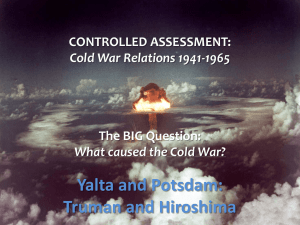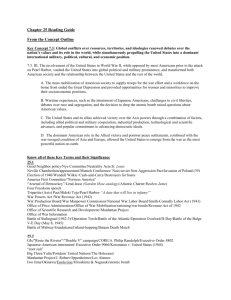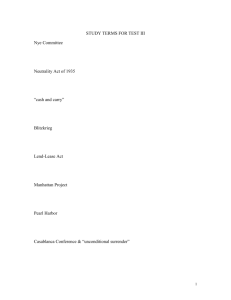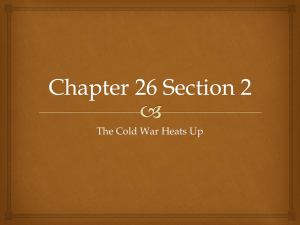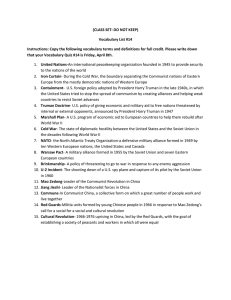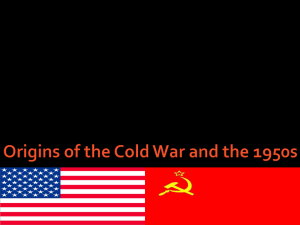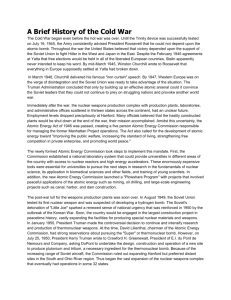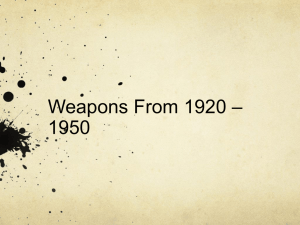GCSE BOOKLET IV - COLD WAR ORIGINS
advertisement
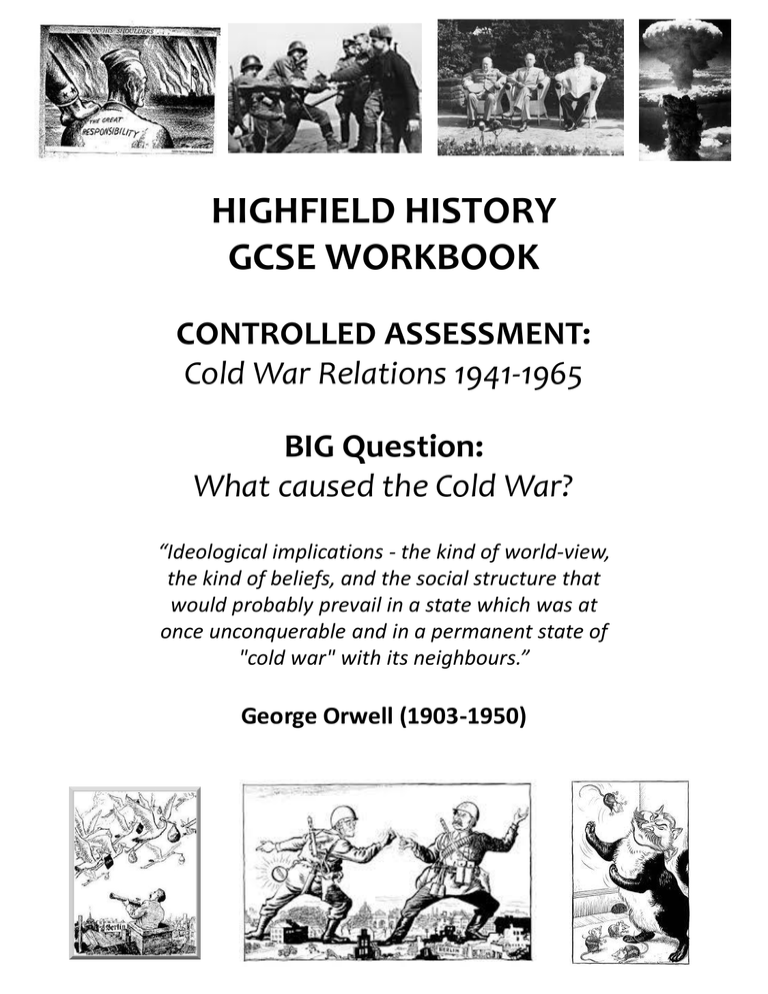
HIGHFIELD HISTORY GCSE WORKBOOK CONTROLLED ASSESSMENT: Cold War Relations 1941-1965 BIG Question: What caused the Cold War? “Ideological implications - the kind of world-view, the kind of beliefs, and the social structure that would probably prevail in a state which was at once unconquerable and in a permanent state of "cold war" with its neighbours.” George Orwell (1903-1950) WHAT CAUSED THE COLD WAR? Title I – USA and USSR: Allies by default II – The “Liberation” of Eastern Europe III – Yalta and Potsdam: Truman and Hiroshima IV – The start of the Arms Race V –Yalta and Potsdam: What to do with Germany? VI – Doctrine and Aid: Dollar Imperialism VII – The Berlin Blockade and Berlin Airlift VIII – NATO OUTLINE OF LEARNING Lesson Objectives Explain why the Americans and Russians were Allies Evaluate interpretations about the reasons for Allied victory in WW2 Homework Source Evaluation Explain why the USSR “liberated” Eastern Europe Evaluate the utility of contemporary leaders' accounts Judge Truman’s position at Potsdam Evaluate the utility of contemporary written sources Describe the conditions that made up the Nuclear Arms Race Utilise statistics as evidence for evaluation Extension Task: “The Atomic Bomb and You” Explain why Berlin was a cause of great tension Extract relevant details from a text source Explain why the USA wanted to help Europe recover from WW2 Evaluate the reliability of political cartoons Judge who is to blame for increasing Cold War tension Compare evidence to support a theory Source Gathering Judge the significance of ideology as a cause of the Cold War Select relevant sources as evidence to support an argument IX – What caused the Cold War? Judge the most significant cause of the Cold War Use a variety of sources as supporting evidence X – Essay Planning Utilise complicated causation language Create an essay plan concerning who or what was to blame for the Cold World 2 Complete remaining planning WHAT CAUSED THE COLD WAR? I – USA and USSR: Allies by default Why was this cartoon produced? What inferences can you make about the cartoon? What can you see in the cartoon? SOURCE A 3 WHAT CAUSED THE COLD WAR? • Explain why the Americans and Russians were Allies • Evaluate interpretations about the reasons for Allied victory in WW2 SOURCE B General Werner Kreipe, a member of the Luftwaffe wrote about the Battle of Britain after the war. Though the air battles over England were perhaps a triumph of skill and bravery so far as the German air crews were concerned, from the strategic point of view it was a failure and contributed to our ultimate defeat. The decision to fight it marks a turning point in the history of the Second World War. The German Air Force was bled almost to death, and suffered losses which could never again be made good throughout the course of the war. SOURCE C George Orwell, BBC radio broadcast (19th September 1942) September 15th 1940 is celebrated as the anniversary because on that day the Royal Air Force shot down no less than 185 German planes, and it was about that date that the failure of the Germans to overwhelm the British defences by daylight bombing became apparent. Now that we can look back and see the events in better perspective it is becoming clear that the Battle of Britain ranks in importance with Trafalgar, Salamis, the defeat of the Spanish Armada and other battles of the past in which the invading forces of a seemingly invincible monarch or dictator have been beaten back and which have formed a turning point in history. 4 HOMEWORK – SOURCE EVALUATION TASK – read through the sources below and answer the questions that accompany them SOURCE D Extract from a letter from the Soviet ambassador in London, Ivan Maisky, to British Foreign Secretary, Anthony Eden, written in 1943. Stalingrad is Stalingrad. Stalingrad is one of the greatest landmarks in human history as an unsurpassed example of heroism and endurance, and as a turning point in the present war. Indeed, suppose for a moment that Stalingrad in the autumn of 1942 would have fallen: what would have been the consequences? In this case the Germans most probably would have been able to move north up the Volga, as Marshal Stalin indicated in his speech on the 6th November, 1942, with the most appalling consequences for our defence. At the same time if Stalingrad had fallen the Germans would have moved down the Volga, swept through the Caucasus to the Caspian Sea, occupied Baku, penetrated Iran, and moved towards the Persian Gulf and India. Simultaneously they would have overrun the whole Middle East and established their rule in Africa. Such would have been the vista of events that would have followed the fall of Stalingrad. SOURCE E An extract from a Tourist Guidebook to Normandy written by Yves Lecouturier (a French Historian) in 1999 These 50 miles of French coastline are marked forever by these first steps towards the liberation of Europe. The cemeteries of the Second World War bear witness to this battle which killed 90,000 Allied and German soldiers. The landing of 6 June 1944 will forever remain the decisive stages in the liberation of Europe and in the outcome of the Second World War. The joy of the Normans to be delivered from the Nazi yoke was immense. Everyone welcomed the liberators with limitless enthusiasm. SOURCE F A Soviet (Russian) historian writing in 1968 There is no doubt that the role of the Soviet Union (the Russians) in defeating the Nazi aggressor has not been fully recognised by the Western Allies. It was the Soviet people who held back the Nazis in Europe for over two years while the Western Allies deliberated and prepared for their invasion. It was the Soviet Union who bled the Germans at Stalingrad and rolled them back towards Berlin. It was the Soviet people who bore the brunt of suffering and sacrificed themselves against fascist tyranny. For too long the West has basked in the glory of June 1944 and forgotten the contribution of our fallen comrades. 5 HOMEWORK – SOURCE EVALUATION What event does each source suggest is the reason for Allied Victory in WW2 (Stalingrad or D-Day)? (include a quote to prove what evidence helped you to work this out). If you feel that your knowledge of WW2 needs boosting have a look on the Year 9 Wikisite to help you. Source D suggests … where it states “ Source E suggests… where it states “ Source F suggests… where it states “ Which of the sources do you think is the most reliable (believable)? You must explain your reason, don’t forget to consider the provenance of the source (who wrote it, and what their motive might be). Even though they all have a strong opinion, they are all useful to you as an historian, in what ways might this be true (even if they are unreliable). 6 WHAT CAUSED THE COLD WAR? II – The “Liberation” of Eastern Europe SOURCE G SOURCE H ‘From Stettin in the Baltic to Trieste in the Adriatic an iron curtain has descended across the Continent. Behind that line lie all the capitals of the ancient states of Central and Eastern Europe. Warsaw, Berlin, Prague, Vienna, Budapest, Belgrade, Bucharest and Sofia, all these famous cities and the populations around them lie in what I must call the Soviet sphere, and all are subject in one form or another, not only to Soviet influence but to a very high and, in some cases, increasing measure of control from Moscow. The Communist parties, which were very small in all these Eastern States of Europe, have been raised to pre-eminence and power far beyond their numbers and are seeking everywhere to obtain totalitarian control. Police governments are prevailing in nearly every case, and so far, except in Czechoslovakia, there is no true democracy… this is certainly not the Liberated Europe we fought to build up. Nor is it one which contains the essentials of permanent peace.’ Winston Churchill, speaking in the USA, in the presence of President Truman, March 1946 7 WHAT CAUSED THE COLD WAR? • Explain why the USSR “liberated” Eastern Europe • Evaluate the utility of contemporary leaders’ accounts SOURCE I ‘The Soviet Union has lost in men several times more than Britain and the United States together. It may be that some quarters are trying to push into oblivion these sacrifices of the Soviet people which insured the liberation of Europe. But the Soviet Union cannot forget them. One can ask therefore, what can be surprising in the fact that the Soviet Union, in a desire to ensure its security for the future, tries to achieve that these countries should have governments whose relations to the Soviet Union are loyal? The growth of the influence of communism cannot be considered accidental. The influence of the Communists grew because during the hard years of the mastery of fascism in Europe, Communists slowed themselves to be reliable, daring and self-sacrificing fighters against fascist regimes for the liberty of peoples. Stalin’s reply to Chuchill’s speech, from an interview with Pravda, March 1946. 8 WHAT CAUSED THE COLD WAR? CONTROLLED ASSESSMENT PARAGRAPH PRACTICE ASSESSMENT OBJECTIVE FOCUS - SOURCES GRADE D – YOU MUST INCLUDE SOME INFORMATION FROM A SOURCE GRADE C – YOU WILL BE TAKING SOURCES AT FACE VALUE(NOT QUESTIONING THEIR ACCURACY) GRADE B – YOU WILL BE USING EXPLICIT DETAILS FROM A SOURCE AND EXPLANING WHAT IT MEANS GRADE A – YOU WILL BE USING A RANGE OF SOURCES TO SUPPORT YOUR ARGUMENT GRADE A* – YOU WILL BE MAKING A RIGOROUS EVALUATION OF A RANGE OF SOURCES TO SUPPORT YOUR ARGUMENT WHY WAS THE “LIBERATION” OF EASTERN EUROPE A CAUSE OF THE COLD WAR? PEER ASSESSMENT – HIGHLIGHT THE GRADE ABOVE WHICH YOU THINK BEST RELATES TO THE PARAGRAPH WRITTEN HERE STUDENT ACTION (SUGGEST HOW YOU ARE GOING TO IMPROVE THIS SKILL IN YOUR NEXT PARAGRAPH) 9 WHAT CAUSED THE COLD WAR? III – Yalta and Potsdam: Truman and Hiroshima SOURCE J We argued freely and frankly across the table. But at the end of every point unanimous agreement was reached ... We know, of course, that it was Hitler’s hope and the German war lords’ hope that we would not agree – that some slight crack might appear in this solid wall of allied unity ... But Hitler has failed. Never before have the major allies been more closely united – not only in their war aims but also in the peace aims. Extract from President Roosevelt’s report to the USA on the Yalta Conference SOURCE K I have always worked for friendship with Russia, but like you, I feel deep anxiety because of this misinterpretation of the Yalta decisions. Extract from a telegram sent by Prime Minister Churchill to President Roosevelt in May 1945 10 WHAT CAUSED THE COLD WAR? • Judge Truman’s position at Potsdam • Evaluate the utility of contemporary written sources 11 WHAT CAUSED THE COLD WAR? IV – The start of the Arms Race • Describe the conditions that made up the Nuclear Arms Race • Utilise statistics as evidence for evaluation SOURCE L The harnessing of the basic power of the universe. The force from which the sun draws its power has been used against those who brought war to the Far East. We have spent $2,000,000,000 on the greatest gamble in history, and we have won. With this bomb we have now added a new and revolutionary increase in destruction to supplement the growing power of our armed forces. In their present form these bombs are now in production and even more powerful forms are in development. It was in spare the Japanese people from utter destruction that the ultimatum of July 26 was issued from Potsdam. Their leaders promptly rejected that ultimatum. If they do not now accept our terms they may expect a rain of run from the air the like of which has never been seen on this earth. Behind this air attack will follow sea and land forces in such numbers and power as they have not yet seen and with a fighting skill of which they have already become well aware. I shall recommend the Congress of the United States to consider promptly establishment of an appropriate Commission to control the production and use of atomic power within the United States. I shall give further consideration and make a further recommendation to Congress as to how atomic power can become a powerful and forceful influence towards the maintenance of world peace. President Harry S. Truman, speech (6th August, 1945) 12 WHAT CAUSED THE COLD WAR? CONTROLLED ASSESSMENT PARAGRAPH PRACTICE ASSESSMENT OBJECTIVE FOCUS – CONTEXTUAL KNOWLEDGE GRADE D – LITTLE SPECIFIC DETAIL OR KNOWLEDGE INCLUDED (VAGUE WAFFLING) GRADE C – THERE IS SOME DETAIL BEING USED HERE, THOUGH IT MAY NOT BE RELEVANT GRADE B – THERE IS SELECTED DETAIL BEING USED HERE TO BACK UP AN EXPLANATION GRADE A – YOU ARE NOW USING RELEVANT AND ACCURATE DETAILS TO SUPPORT AN ARGUMENT GRADE A* – YOU WILL BE INCLUDING A RANGE OF DETAILS THAT ARE RELEVANT AND ACCURATE TO SUPPORT AN ARGUMENT WHY WAS THE NUCLEAR ARMS RACE A CAUSE OF THE COLD WAR? PEER ASSESSMENT – HIGHLIGHT THE GRADE ABOVE WHICH YOU THINK BEST RELATES TO THE PARAGRAPH WRITTEN HERE STUDENT ACTION (SUGGEST HOW YOU ARE GOING TO IMPROVE THIS SKILL IN YOUR NEXT PARAGRAPH – HAVE YOU CONTINUED TO INCLUDE EVIDENCE FROM SOURCES?) 13 WHAT CAUSED THE COLD WAR? EXTENSION HOMEWORK READ THROUGH THE ARTICLE “THE ATOMIC BOMB AND YOU” BY GEORGE ORWELL OVER THE NEXT TWO PAGES, AS YOU READ REMEMBER THAT THIS WAS PUBLISHED SHORTLY AFTER THE ANNOUNCEMENT TO THE PUBLIC THAT AN ATOMIC BOMB EXISTED, THE PUBLIC KNEW LITTLE ABOUT IT, THIS EXPRESSES THE CONCERNS, HOPES AND FEARS OF A BRITISH PUBLIC IN THE MONTHS FOLLOWING THE END OF THE SECOND WORLD WAR. THIS IS THE FIRST TIME ANYONE USED THE PHRASE “COLD WAR”. YOUR TASK IS TO SUMMARISE ORWELL’S WRITING IN NO MORE THAN 100 WORDS, THEN REDUCE IT TO NO MORE THAN TEN WORDS In 100 words, “The Atomic Bomb and You” In 10 words, “The Atomic Bomb and You” THE ATOMIC BOMB AND YOU – GEORGE ORWELL (1ST OCTOBER 1945) Considering how likely we all are to be blown to pieces by it within the next five years, the atomic bomb has not roused so much discussion as might have been expected. The newspapers have published numerous diagrams, not very helpful to the average man, of protons and neutrons doing their stuff, and there has been much reiteration of the useless statement that the bomb ‘ought to be put under international control.’ But curiously little has been said, at any rate in print, about the question that is of most urgent interest to all of us, namely: ‘How difficult are these things to manufacture?’ Such information as we--that is, the big public--possess on this subject has come to us in a rather indirect way, apropos of President Truman’s decision not to hand over certain secrets to the USSR. Some months ago, when the bomb was still only a rumour, there was a widespread belief that splitting the atom was merely a problem for the physicists, and that when they had solved it a new and devastating weapon would be within reach of almost everybody. (At any moment, so the rumour went, some lonely lunatic in a laboratory might blow civilisation to smithereens, as easily as touching off a firework.) Had that been true, the whole trend of history would have been abruptly altered. The distinction between great states and small states would have been wiped out, and the power of the State over the individual would have been greatly weakened. However, it appears from President Truman’s remarks, and various comments that have been made on them, that the bomb is fantastically expensive and that its manufacture demands an enormous industrial effort, such as only three or four countries in the world are capable of making. This point is of cardinal importance, because it may mean that the discovery of the atomic bomb, so far from reversing history, will simply intensify the trends which have been apparent for a dozen years past. It is a commonplace that the history of civilisation is largely the history of weapons. In particular, the connection between the discovery of gunpowder and the overthrow of feudalism by the bourgeoisie has been pointed out over and over again. And though I have no doubt exceptions can be brought forward, I think the following rule would be found generally true: that ages in which the dominant weapon is expensive or difficult to make will tend to be ages of despotism, whereas when the dominant weapon is cheap and simple, the common people have a chance. Thus, for example, thanks, battleships and bombing planes are inherently tyrannical weapons, while rifles, muskets, long-bows and hand-grenades are inherently democratic weapons. A complex weapon makes the strong stronger, while a simple weapon -- so long as there is no answer to it -- gives claws to the weak. The great age of democracy and of national self-determination was the age of the musket and the rifle. After the invention of the flintlock, and before the invention of the percussion cap, the musket was a fairly efficient weapon, and at the same time so simple that it could be produced almost anywhere. Its combination of qualities made possible the success of the American and French revolutions, and made a popular insurrection a more serious business than it could be in our own day. After the musket came the breech-loading rifle. This was a comparatively complex thing, but it could still be produced in scores of countries, and it was cheap, easily smuggled and economical of ammunition. Even the most backward nation could always get hold of rifles from one source or another, so that Boers, Bulgars, Abyssinians, Moroccans -- even Tibetans -- could put up a fight for their independence, sometimes with success. But thereafter every development in military technique has favoured the State as against the individual, and the industrialised country as against the backward one. There are fewer and fewer foci of power. Already, in 1939, there were only five states capable of waging war on the grand scale, and now there are only three--ultimately, perhaps, only two. This trend has been obvious for years, and was pointed out by a few observers even before 1914. The one thing that might reverse it is the discovery of a weapon--or, to put it more broadly, of a method of fighting--not dependent on huge concentrations of industrial plant. From various symptoms one can infer that the Russians do not yet possess the secret of making the atomic bomb; on the other hand, the consensus of opinion seems to be that they will possess it within a few years. So we have before us the prospect of two or three monstrous super-states, each possessed of a weapon by which millions of people can be wiped out in a few seconds, dividing the world between them. It has been rather hastily assumed that this means bigger and bloodier wars, and perhaps an actual end to the machine civilisation. But suppose--and really this the likeliest development--that the surviving great nations make a tacit agreement never to use the atomic bomb against one another? Suppose they only use it, or the threat of it, against people who are unable to retaliate? In that case we are back where we were before, the only difference being that power is concentrated in still fewer hands and that the outlook for subject peoples and oppressed classes is still more hopeless. When James Burnham wrote THE MANAGERIAL REVOLUTION it seemed probable to many Americans that the Germans would win the European end of the war, and it was therefore natural to assume that Germany and not Russia would dominate the Eurasian land mass, while Japan would remain master of East Asia. This was a miscalculation, but it does not affect the main argument. For Burnham’s geographical picture of the new world has turned out to be correct. More and more obviously the surface of the earth is being parcelled off into three great empires, each self-contained and cut off from contact with the outer world, and each ruled, under one disguise or another, by a self-elected oligarchy. The haggling as to where the frontiers are to be drawn is still going on, and will continue for some years, and the third of the three super-states--East Asia, dominated by China--is still potential rather than actual. But the general drift is unmistakable, and every scientific discovery of recent years has accelerated it. We were once told that the aeroplane had ‘abolished frontiers’; actually it is only since the aeroplane became a serious weapon that frontiers have become definitely impassable. The radio was once expected to promote international understanding and co-operation; it has turned out to be a means of insulating one nation from another. The atomic bomb may complete the process by robbing the exploited classes and peoples of all power to revolt, and at the same time putting the possessors of the bomb on a basis of military equality. Unable to conquer one another, they are likely to continue ruling the world between them, and it is difficult to see how the balance can be upset except by slow and unpredictable demographic changes. For forty or fifty years past, Mr. H.G. Wells and others have been warning us that man is in danger of destroying himself with his own weapons, leaving the ants or some other gregarious species to take over. Anyone who has seen the ruined cities of Germany will find this notion at least thinkable. Nevertheless, looking at the world as a whole, the drift for many decades has been not towards anarchy but towards the reimposition of slavery. We may be heading not for general breakdown but for an epoch as horribly stable as the slave empires of antiquity. James Burnham’s theory has been much discussed, but few people have yet considered its ideological implications-that is, the kind of world-view, the kind of beliefs, and the social structure that would probably prevail in a state which was at once UNCONQUERABLE and in a permanent state of ‘cold war’ with its neighbours. Had the atomic bomb turned out to be something as cheap and easily manufactured as a bicycle or an alarm clock, it might well have plunged us back into barbarism, but it might, on the other hand, have meant the end of national sovereignty and of the highly-centralised police state. If, as seems to be the case, it is a rare and costly object as difficult to produce as a battleship, it is likelier to put an end to large-scale wars at the cost of prolonging indefinitely a ‘peace that is no peace’. WHAT CAUSED THE COLD WAR? ONGOING FEEDBACK MEDAL COMMENT HOW TO PROGRESS STUDENT ACTION 17 WHAT CAUSED THE COLD WAR? V –Yalta and Potsdam: What to do with Germany? SOURCE M Evening Standard July 1945 18 WHAT CAUSED THE COLD WAR? • Explain why Berlin was a cause of great tension • Extract relevant details from a text source SOURCE N He (Truman) would come prepared on each subject with a short, firm declaratory statement of US policy, and when he had said his little piece he did little in subsequent discussion except reaffirm it. Winston was good but patchy. He was perhaps too ready to indulge in long dissertations which were evidently not to President Truman's taste. Stalin, on the other hand, spoke quietly, shortly, in little staccato sentences which Pavlov, his young interpreter, translated immediately into forceful English. In the discussions Stalin was often humorous, never offensive; direct and uncompromising. His hair was greyer than I expected, and was thinning. His eyes looked to me humorous, and often showed as mere slits, but he had a trick of looking up when he was thinking or speaking, to the ceiling to the right, and much of the time he would be pulling at a Russian cigarette. Walter Monckton, Britain's Solicitor-General, wrote about the Potsdam meeting on 3rd August, 1945. SOURCE O The Gradual Growth of Administration in the British Zone. The decision of the Potsdam Conference to treat Germany as a single economic unit proved impossible to carry out. The victorious powers had made an agreement that required unanimity by the Control Council for every decision. (The Allied Control Council was the four-power body set up to decide questions concerning Germany as a whole.) But the four powers were never agreed on their programme for Germany and the Soviet Union in particular pursued its own policy. At first even the three Western powers disagreed over policy towards Germany. The four occupation zones were drifting further and further apart economically and the economic chaos grew from the spring of 1945 onwards. Germany's economic structure required an exchange of agricultural products from the East, and to a lesser extent the South of the country, with the industrial production of the Ruhr and of other industrial regions. This exchange was stopped by the division of the country into four zones. The zonal commanders acted on the directives of their respective governments and each pursued his own policy in his own zone. This could only further hinder an economy already largely paralysed by the ravages of war. Konrad Adenauer, Memoirs 1945-53 (12th July, 1952) 19 WHAT CAUSED THE COLD WAR? VI – Doctrine and Aid: Dollar Imperialism SOURCE P This Russian cartoon from 1947 shows Uncle Sam on the left and on the right are Greek communists. SOURCE Q This cartoon of 1 October 1947 by EH Shepard for the British magazine Punch shows Marshall (on the left) telling 'Uncle Sam' - i.e. the American nation - that American Aid is needed to shore up the countries of western Europe: 'Come on Sam! It's up to us again.' SOURCE R This cartoon of 18 June 1947 by EH Shepard for the British magazine Punch shows Truman and Stalin as two taxi-drivers trying to get customers. The 'customers' are labelled 'Turkey', Hungary', 'Bulgaria', 'Austria’ 20 WHAT CAUSED THE COLD WAR? • Explain why the USA wanted to help Europe recover from WW2 • Evaluate the reliability of political cartoons SOURCE S “The ruling gang of American imperialists has taken the path of open expansion, of enslaving weakened capitalist countries. It has hatched new war plans against the Soviet Union. Imitating Hitler, the new aggressors are using blackmail.” GM Malenkov, a Soviet politician, speaking in 1947 about the Marshall Plan. Andrei Zhdanov echoed this opinion 21 WHAT CAUSED THE COLD WAR? VII – The Berlin Blockade and Berlin Airlift 22 WHAT CAUSED THE COLD WAR? • Judge who is to blame for increasing Cold War tension • Compare evidence to support a theory SOURCE T 23 WHAT CAUSED THE COLD WAR? CONTROLLED ASSESSMENT PARAGRAPH PRACTICE ASSESSMENT OBJECTIVE FOCUS – KEY FEATURES GRADE D – FEW REASONS GIVEN, NO LINKS BETWEEN FACTORS SUGGESTED GRADE C – SOME REASONS IDENTIFIED AND OR DESCRIBED, UNSUPPORTED GRADE B – SOME OPINION GIVEN WITH UNDERSTANDING OF REASONS THOUGH NOT FULLY SUPPORTED GRADE A – REASONABLE UNDERSTANDING OF INTERRELATIONSHIP BETWEEN THESE TWO FACTORS, SUPPORTED OPINON GIVEN GRADE A* – GOOD RANGE OF KEY FEATURES OF RELATIONSHIP BETWEEN THESE TWO EVENTS, WELL REASONED AND SUPPORTED ARGUMENT GIVEN WAS THE BERLIN BLOCKADE OR THE AIRLIFT A GREATER CAUSE OF TENSION IN THE COLD WAR? PEER ASSESSMENT – HIGHLIGHT THE GRADE ABOVE WHICH YOU THINK BEST RELATES TO THE PARAGRAPH WRITTEN HERE STUDENT ACTION (SUGGEST HOW YOU ARE GOING TO IMPROVE THIS SKILL IN YOUR NEXT PARAGRAPH – HAVE YOU CONTINUED TO INCLUDE EVIDENCE FROM SOURCES AND YOUR CONTEXTUAL KNOWLEDGE?) 24 WHAT CAUSED THE COLD WAR? HOMEWORK – SOURCE GATHERING USING THE WIKI AND LINKS FROM IT TO OTHER SITES YOUR TASK IS TO FIND ONE WRITTEN SOURCE AND ONE PICTURE SOURCE (AS A MINIMUM), WHICH YOU HAVEN’T ALREADY GOT IN YOUR WORKBOOK. YOU ARE TO EITHER CUT AND PASTE IT BY HAND OR ELECTRONICALLY INTO THE NEXT PAGE. YOU WILL THEN NEED TO FILL IN THE LAYERS OF INTERENCE AROUND THEM AND THE TWO BOXES BETWEEN THEM TO EXPLAIN WHY THEY ARE DIFFERENT. THIS SHOULD BE LOOKING INTO THE NATURE, ORIGIN AND PURPOSE OF THEM BOTH. THEY CAN BE ON ANY OF THE TOPICS THAT WE HAVE SO FAR COVERED IN THE COLD WAR, BUT THEY SHOULD BOTH BE ABOUT THE SAME TOPIC – IN THE NEXT LESSON YOU WILL NEED TO COMPARE HOW IMPORTANT THE EVENT / INDIVIDUAL / THEME IS COMPARED TO THE CREATION OF NATO. FOR EXAMPLE 25 EVALUATION – HOW RELIABLE OR USEFUL IS THIS SOURCE? HOW DOES THIS SOURCE LINK BACK TO THE QUESTION , WHAT CAUSED THE COLD WAR? WHAT DOES THE SOURCE TELL US ABOUT THIS CAUSE? What are the differences between these two sources? Why might these two sources have differences? EVALUATION – HOW RELIABLE OR USEFUL IS THIS SOURCE? HOW DOES THIS SOURCE LINK BACK TO THE QUESTION , WHAT CAUSED THE COLD WAR? WHAT DOES THE SOURCE TELL US ABOUT THIS CAUSE? WHAT CAUSED THE COLD WAR? VIII – NATO SOURCE U 27 WHAT CAUSED THE COLD WAR? • Judge the significance of ideology as a cause of the Cold War • Compare two reasons for the Cold War using sources as evidence to support an argument USING THE GUIDANCE FROM YOUR THREE PREVIOUS PACTICE PARAGRAPHS YOU NEED TO PRODUCE AN ARGUMENT THAT COMPARES YOUR HOMEWORK EVENT / INDIVIDUAL / THEME TO THE CREATION OF NATO – REMEMBER TO ANSWER THE QUESTION – “WHAT CAUSED THE COLD WAR?” 28 WHAT CAUSED THE COLD WAR? IX – What caused the Cold War? • Judge the most significant cause of the Cold War • Use a variety of sources as supporting evidence DIAGRAM EXPLAINING WHAT SIGNIFICANCE EACH CAUSE PLAYS AGAINST EACH OTHER 29 WHAT CAUSED THE COLD WAR? ONGOING FEEDBACK MEDAL COMMENT HOW TO PROGRESS STUDENT ACTION 30
